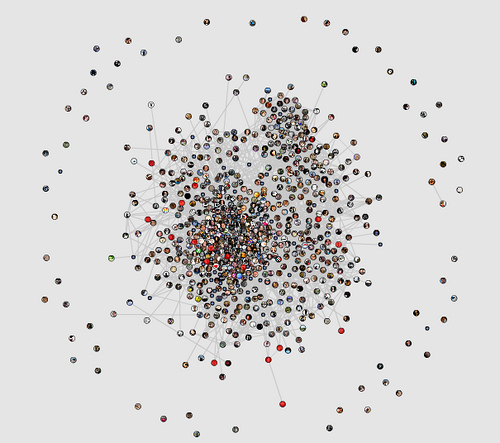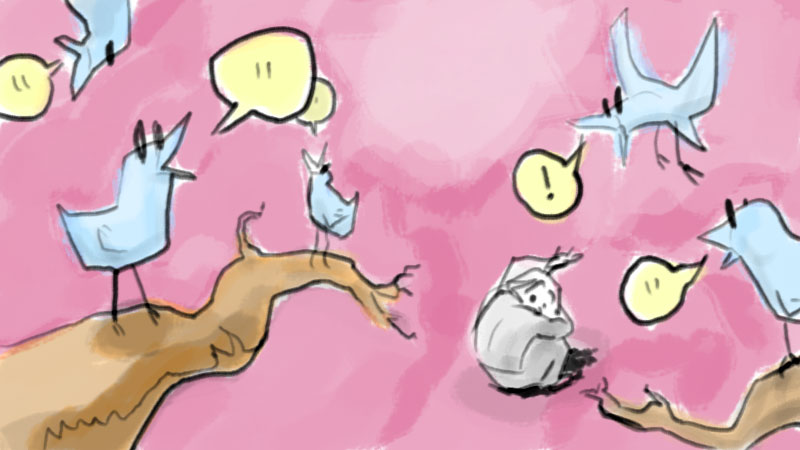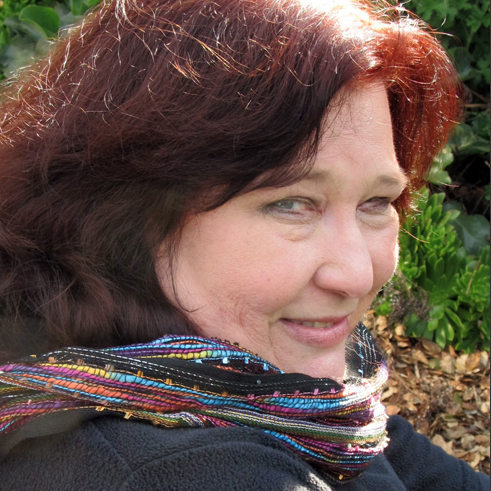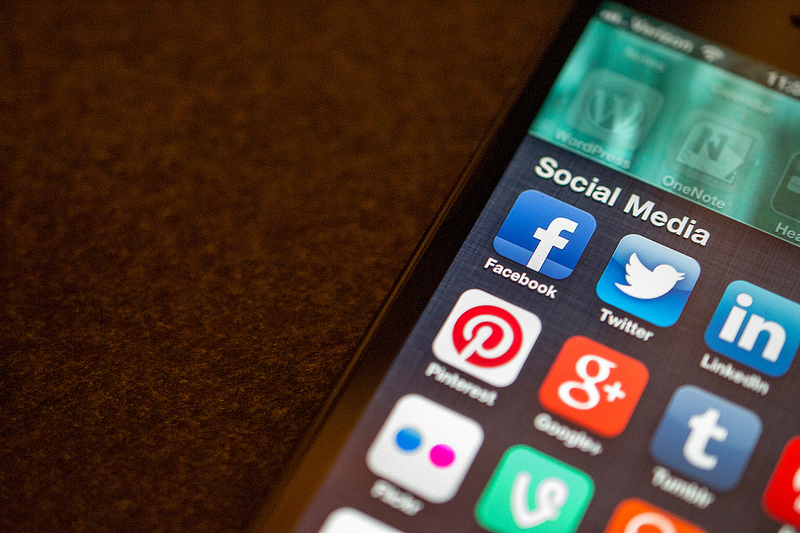Theme Essay by Anne R. Allen
Why Authors Don't Need a Zillion Twitter Followers
Blog more! Tweet more! Send more newsletters! Churn out twelve books a year! And don't query us unless your Klout rating is as high as Justin Bieber's!
These demands should sound familiar to the average working writer.
"It never feels like there are enough hours in the day, or days in the weeks, or weeks in the months, or months in the year," laments author and former literary agent Nathan Bransford in a recent blog post. Then he points the finger at one culprit:
Social media only adds to the pressure. People are completing novels and making New York Times bestseller lists and curing cancer while juggling on a unicycle and it all looks so effortless and who needs sleep anyway??
 It turns out that human beings—even writers—do need sleep. Authors are creative human beings, not machines. Creativity is subject to departure without notice, leaving depression and anxiety in its wake. In the sidebar that follows, I highlight seven ways that social media doesn't work and can lead to serious burnout.
It turns out that human beings—even writers—do need sleep. Authors are creative human beings, not machines. Creativity is subject to departure without notice, leaving depression and anxiety in its wake. In the sidebar that follows, I highlight seven ways that social media doesn't work and can lead to serious burnout.
More to the professional point, though, if one author appears to be the cancer-curing, juggling unicyclist we're told to be, the freak magic act increases the pressure on us all.
Yes, most writers have to use social media these days. They need to have a Web presence, be Googleable, and offer fans a way to interact. But they need to be smart about it, too, never forgetting that their main job is to write books.
The most troubling thing about all the pressure to build a social media platform is that much of it is based on misinformation. The online world reinvents itself at least every two years, and the creaky old publishing business has had a hard time keeping up. Publishers, big and small, have jumped on the social media party train; unfortunately, they often jump on the caboose instead of the engine.
If you're in a master/slave relationship with an agent or publisher, you may be forced to do this stuff. (But you can be excused for slipping a link to this article into your next email.) If you're an indie, you can ignore it all and do what actually works.
Right now, what works is having lots of sales and freebies and—if you can afford it—advertising them on vetted newsletters like Bookbub, eReader Daily News, or Ebook Bargains UK. But next week, it will probably be something different.
Only two things can be counted on to enhance your visibility as a writer. The first is to interact with readers in a real, honest, and generous way on the social media platform of your choice. In a Reddit interview this spring, bestselling indie author Hugh Howey said he focused on the readers he already had instead of trolling the universe for more. When you create the kind of goodwill and loyal fan base he has, word of mouth spreads news of your books.
The second thing is to write good books. While there may be authors who can actually churn out twelve books a year, I sure can't. None of my favorite authors can, either. A good book is thoughtful and reflects a writer's life experience.
If you're chained to your computer, mindlessly tweeting, blogging about writer's block, and posting LOL cat pictures to Facebook, you're not experiencing life, so you're not going to have much to write about. Except maybe your exciting trip to the dumpster to empty Fluffy's litter box.

Seven Ways Authors Waste Time on Social Media
Twitter and Facebook are the top two time sinks for authors, but there are others as well—and more social media black holes keep popping up every day. In fact, a writer can do much better finding readers on a smaller social network like Red Room, She Writes, or WANATribe—sites where both readers and writers congregate and you can engage with people.
Even simply commenting regularly on blogs or literary websites like Talking Writing can help form community and get your name out there. If I see a new book by somebody who's commented on my blog, you bet I'm going to check it out—much more than if I get a notice of a book launch from one of my 600 "friends" on Facebook.
Time Sink 1: Racking up Thousands of Twitter Followers
The only followers who matter are the ones who read your books and blog posts and interact with you. An author with fifty engaged fans on Twitter is going to be far more effective than one with a thousand detached strangers.
And yet, I'm amazed at all the spam I get offering to sell me followers. A "follower" whose identity has been obtained by fraud and sold to a hawker's mailing list is not going to be a willing customer of my book. Buying thousands of Twitter followers and calling it a "platform" is like renting a lot of empty safety deposit boxes and saying you're rich.
Paying somebody to send out a stream of tweets saying "buy my book" is pointless, too. I don't know anybody who has ever bought a book because they were ordered to in a tweet from a stranger.
Time Sink 2: Madly Promoting "Likes" on Your Facebook Page
People actually pay for ads on Facebook and give prizes to readers in order to get more "likes" for an author page. But an update on an author "like" page will only get a dozen or so views now—unless you pay extra fees—and you're not allowed to interact on other pages or groups unless you have a personal page as well.
Therefore, requiring an author to have a certain number of Facebook likes/friends has now become even more pointless than the Twitter-follower thing. Sure, it's a good idea to have an author page so you have a Facebook presence—it's like having an ad in the Yellow Pages—but the number of likes has no impact on book sales. (Ditto Amazon author page likes.)
A personal Facebook page is much more useful, but if you sign up for a personal page, you open a whole new worm can. Facebook encourages spammers, scammers, and gamers who try to trick you into giving out the personal information of all your friends so they can sell it to marketers.
For me as an author, Facebook is only useful for (1) networking with other writers in the various FB writing groups I belong to; and (2) announcing freebie and sale days on pages like "Free Kindle and Nook eBooks for Readers." (There are hundreds of these. It's kind of a crapshoot which ones will work.)
As far as privacy goes—you might as well live in a picture window like an Amsterdam hooker. NSA, eat your heart out: Facebook has been invading our privacy for years in ways governments can only dream about.
Time Sink 3: Amassing a Huge List of Email Addresses for a Newsletter
I hate newsletters. They're mostly rehashed content from blogs or websites and chest-beating self-praise. A lot of spam-blocker programmers apparently feel the same way, because most spam-blockers will block anything sent to more than ten addresses.
When it comes to sending newsletters out to everybody who has ever commented on your blog or emailed you: Just don't. No matter how much your marketing department hammers you to do so. Not only is it likely to end up in a spam folder, but mass-marketing to people who are not your fans only annoys them.
"Newsletters are so 2005," writes marketing guru Jon Morrow in a recent blog post:
Not long ago, publishing was a one-way street. You wrote a newsletter, article, or white paper, sent it to your readers, and they either read it or ignored it. End of story. With social media, though, communication now flows both ways. Yes, we still publish information, but now our readers respond back to us, leaving comments, sharing with their friends, and linking to us from their own blogs and websites. It's a complete game changer.
Instead of an e-newsletter, establish an enticing blog and enable email subscriptions to blog updates. It's more interactive and up-to-date than a newsletter and accomplishes the same goal. Morrow points out that blog posts can be tweeted and shared with thousands, instead of forwarded to one person (if you're lucky). I do send a private email to a few selected friends to announce new blog posts, but that's it.
Time Sink 4: Blogging Every Day
I'm an advocate of Slow Blogging, based on the "Slow Blog Manifesto" written by Canadian software designer Todd Sieling in 2006. A blog is still the best place to establish a Web presence, build a platform, and interact with readers—but you can do that with weekly, bi-weekly, even monthly posts. In Sieling's words:
Slow Blogging is a rejection of immediacy. It is an affirmation that not all things worth reading are written quickly, and that many thoughts are best served after being fully baked and worded in an even temperament.
Advice to blog every day comes from the Jurassic era of the weblog, when there were maybe ten thousand of them, not uncountable billions. Now, bloggers who blog every day are likely to (1) blather-blog, because they've run out of things to say; (2) burn themselves out; (3) have no time to write new books; and (4) annoy readers with too many notifications of new posts.
I'm so grateful to bloggers who only publish one or two great posts a month. I can enjoy their work instead of tearing through it or feeling guilty that I'm skipping it.
Remember: Readers have lives. Chances are very good they don't revolve around you.
Time Sink 5: Participating in Expensive, Grueling Blog Tours
My book sales spike when I visit other blogs. And a professional blog tour organizer can be hugely valuable in helping target blogs where your potential readers congregate. For instance: Black, White, and Read Tours, which was formed by three book bloggers who only charge a small amount and have respectful relationships with the bloggers their touring authors will visit.
But big, month-long blog tours are usually too expensive to be cost effective and often create an unpleasant experience for authors and bloggers alike.
Part of the problem is that the publicist or marketer who sends you on the tour is making money, and the tour organizer is making money—but the bloggers you visit aren't making a dime. These are the people doing the actual work of reading, reviewing, and interviewing.
E-books do not have to be marketed like print books with a big splashy launch and a "tour." You can build readership slowly, since e-retailers have infinite shelf space, and your book won't be returned if it doesn't make huge sales in its first month.
Instead, be a guest blogger once or twice a month throughout the year. Network with book bloggers yourself. Read their reviews and interviews, and comment on them. Devoting a few minutes a day to informal blog touring instead of an intense, soul-crushing month will yield richer rewards.
Time Sink 6: Blog Hopping
Blog hops are big in the indie author community right now and can be fun. They're a good way for newbies to meet and network with other writers and to gain some blog followers. But if you're an established author, a blog hop can be a huge time suck. They generally don't involve readers—just other authors, who are not your best audience.
"Hops" often include a big prize like an iPad to be given in some contest that involves tweeting frantically and visiting each blog, leaving a comment saying it's a great site and you'd sure love to have a free iPad. Everybody contributes a chunk of cash, and some author with writer's block and nothing to do but tweet and comment for a week gets the prize.
Nice for the blocked author. Pointless for everybody else. Yes, you get more hits, but they're usually not from people who are likely to come back.
On the other hand, getting together with fellow authors in your genre to do a joint sale or promotion can be very successful, as I found out when teaming up with other members of the "Official Chick Lit Group" on Facebook last May. We all posted an ad for the promo on our blogs, but didn't have to hop around to every blog or write time-wasting posts and make identical, inane comments.
Time Sink 7: Worrying About Your Social Media Rating
Social media ranking systems like Klout and PeerIndex show one thing: how much time you spend on the Internet instead of writing books. If you're dealing with marketers who are in love with numbers, I hereby bestow a rank of 10 million "ARA points" on each of you.
When somebody puts you down for not having a Klout rating over 80, just roll your eyes and say "Klout is so over. I have 10 million ARA points." Then get out the smelling salts. Big, meaningless numbers make these people swoon.
And after they've fainted, go back to what you were doing in the first place. The best way to sell books is to write more books. Good ones.
Publishing Information
- "Writer's Cramp: In the E-Reader Era, a Book a Year Is Slacking" by Julie Bosman, New York Times, May 12, 2012.
- "When It Feels Like You're Never Doing Enough," post by Nathan Bransford on his blog, June 10, 2013.
- "Writer's Block and Depression: Why You Shouldn't Bully Your Muse," post by Anne R. Allen on her blog, May 29, 2011.
- "Hugh Howey Reveals His Single Most Valuable Self-Promotion Tool" by Jason Boog, Galley Cat, March 13, 2013.
- "Why You Shouldn't Create a Newsletter (and What to Do Instead)," post by Jon Morrow on Boost Blog Traffic, June 12, 2013.
- "The Slow Blog Manifesto...and 8 Reasons Why Slow Blogging Will Help Your Career, Your Love Life, and Protect You From Angry Elephants,", post by Anne R. Allen on her blog, June 3, 2012.
- "Manifesto" by Todd Sieling on Slow Blog: It Happens When It Happens.
Art Information
- "Social Media Apps" © Jason A. Howie; Creative Commons License.
- "Facebook Social Graph" © Rafiq Phillips; Creative Commons License.
- "Twitter" © Pete Simon; Creative Commons License.
 Anne R. Allen is a blogger, a poet, and the author of six romantic-comedy mysteries published by Mark Williams International Digital Publishing: Food of Love, The Gatsby Game, and the Camilla Randall Mysteries: Ghostwriters in the Sky, Sherwood, Ltd, The Best Revenge, and No Place Like Home. Her latest comedy, The Lady of the Lakewood Diner, will launch in October 2013.
Anne R. Allen is a blogger, a poet, and the author of six romantic-comedy mysteries published by Mark Williams International Digital Publishing: Food of Love, The Gatsby Game, and the Camilla Randall Mysteries: Ghostwriters in the Sky, Sherwood, Ltd, The Best Revenge, and No Place Like Home. Her latest comedy, The Lady of the Lakewood Diner, will launch in October 2013.
Anne R. Allen's Blog…with Ruth Harris has been named one of the Best 101 Websites for Writers by Writer's Digest. Anne and Catherine Ryan Hyde have also published How to Be a Writer in the E-Age.
This article was originally published in a different form on Anne's blog as "7 Ways Authors Waste Time 'Building Platform' on Social Media," June 16, 2013.

